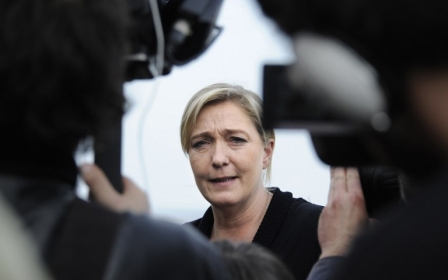UN conference addresses rise in anti-Muslim hate

NEW YORK, United States – European and North American officials warned at the United Nations on Tuesday of a spike in anti-Muslim hate crimes, against a backdrop of gains by right-wing nativist politicians across many Western countries.
The high-level event, organised by Western governments and the Organization of Islamic Cooperation (OIC), took place ahead of this week's inauguration of Donald Trump as US president, after an election campaign in which he mooted travel bans on Muslims.
“Anti-Muslim hate crimes and other forms of bigotry are on the rise,” Antonio Guterres, the recently-appointed UN secretary general, said in a pre-recorded video message to delegates in midtown Manhattan.
'We must have the courage to confront narratives when they are based on prejudice, or blatant lies, so that they do not become part of the mainstream'
-Stavros Lambrinidis, EU human rights envoy
“In times of insecurity, communities that look different become convenient scapegoats. We must resist cynical efforts to divide communities and portray neighbours as the other. Discrimination diminishes us all.”
According to officials, anti-Muslim hate crimes have almost doubled in Britain and France while American Muslims endured more attacks in 2015 than at any time since the 9/11 strikes on New York and Washington.
Mosques and Islamic centres across Europe and North America are occasionally daubed with offensive graffiti. Experts outlined a growing menace of hate speech and trolling of Muslims via Facebook, Twitter and other online social networks.
“Some say we live in a post-truth world,” said EU human rights envoy Stavros Lambrinidis. “We must have the courage to confront narratives when they are based on prejudice, or blatant lies, so that they do not become part of the mainstream.”
Headscarf-wearing Muslim women are particularly vulnerable, often facing verbal insults or having veils pulled from their faces. More worryingly, imams and others wearing Islamic garb have been slain in the streets.
“The data leaves no doubt that the incidence of anti-Muslim discrimination and hate are on the rise and this alarming development requires our immediate attention,” said David Saperstein, US envoy on religious freedom.
He noted that levels of anti-Muslim violence in the West pale in comparison to the killings of Rohingya Muslims in Myanmar, Muslims in Central African Republic or bloodshed from Sunni-Shia clashes in the Middle East in recent years.
During his election campaign, Trump won fans by blaming job shortages and crime on undocumented Mexican migrants and promising to deter future militant attacks by clamping down on refugees and immigrants from mostly-Muslim countries.
Across the Atlantic, fears of immigrants swayed Britain’s decision to leave the EU in the June “Brexit” referendum. Right-wing nationalists are expected to fare similarly well in upcoming polls in France, Germany and the Netherlands.
Anti-immigrant populists are not without ammunition. They point to bloody attacks linked to the Islamic State group in Paris, Nice, Brussels and Berlin in recent months, as well as the US hits in San Bernardino, California, and Orlando, Florida.
While the number of Middle Easterners travelling to Europe has dropped since the height of the refugee crisis in late 2015, more than 1,000 people reached the continent by sea in the first two weeks of 2017. Many came from war-ravaged Syria and other mostly-Muslim countries.
“It is true that the current political climate in Europe is very toxic,” Alfiaz Vaiya, coordinator of the European Parliament Anti-Racism and Diversity Intergroup (ARDI), told Middle East Eye on the side-lines of the UN event.
“As the Brexit vote and Trump’s victory showed, we cannot take anything for granted. We do have a threat in Europe that we could have some politicians on the extreme far right if not leading governments, then leading parties that gain the most votes.”
During the day-long meet, Lambrinidis and others outlined how officials must enact and enforce laws against inciting violence, while educating children about the European values of diversity and religious freedom.
But according to Arsalan Suleman, the US envoy to the OIC, the problem is too big for governments alone. Businesses and civil groups must get on board to tackle the tough “challenges we’re facing,” he told MEE.
Shaarik Zafar, the US State Department’s envoy to Muslim communities, said American Muslims must try to win over Christian and Jewish groups to help their standing in the broader American society.
“The US has a secular government but is a deeply religious country, so being religious in the United States is not weird, unlike in some other places. So there’s an opportunity for Muslim groups to work with” other faith-based groups, he told MEE.
Not everyone was convinced that delegates would come good on their lofty talk.
Susan Smith, a convert to Islam who works for a small US-based religious think tank, the Muslim Peace Fellowship, said talk of US officials "building trust" with Muslim communities can have the opposite effect.
“Most Muslim children will tell you, especially if they wear identifiers like a scarf, that they have experienced bias and discrimination from other schoolchildren or their teachers, though very few of these incidents ever gets reported,” Smith told MEE.
“At the same time, we know at least 10,000 Department of Justice spies are embedded in Islamic institutions. If they want to get our trust to report anti-Muslim violence, their first step is to stop spying and doing mass surveillance on our communities.”
Stay informed with MEE's newsletters
Sign up to get the latest alerts, insights and analysis, starting with Turkey Unpacked
Middle East Eye delivers independent and unrivalled coverage and analysis of the Middle East, North Africa and beyond. To learn more about republishing this content and the associated fees, please fill out this form. More about MEE can be found here.




